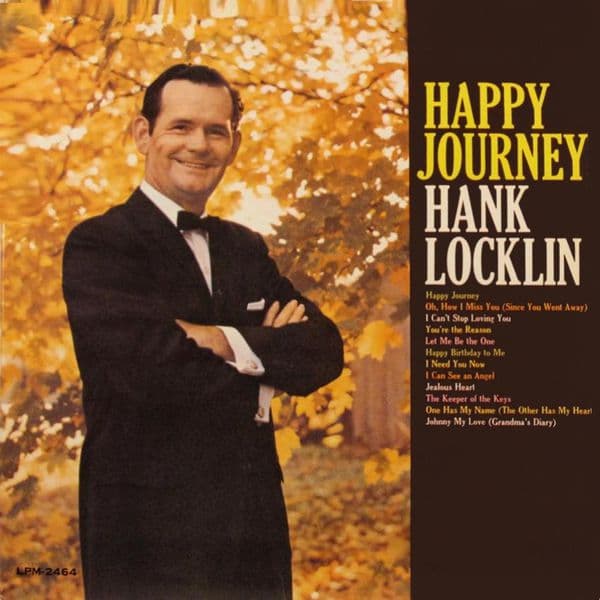
A Lover’s Urgent Plea: The Desperate Cry to Reclaim a Fading Romance in a Last-Ditch Effort
Hank Locklin‘s impassioned and deeply urgent ballad, “Rosalita”, stands as a powerful testament to his ability to deliver poignant stories of love and desperation with his signature smooth yet heartfelt style. This evocative track was a significant hit for Locklin, reaching an impressive number 7 on the Billboard Hot Country Singles chart in 1963. Its success wasn’t merely due to its melodic charm; it was a profound testament to Locklin‘s sincere delivery and the song’s universal message of clinging to a love that’s on the brink of slipping away. While not a crossover pop hit, “Rosalita” solidified his reputation as a balladeer capable of conveying deep emotional urgency with a quiet intensity, appealing to millions who found solace and understanding in his portrayal of a last-ditch effort to save a relationship. Featured on his 1963 album, “The Ways of Life” (which also performed well on the country charts), this song became a beloved classic for fans who cherished its raw emotional honesty and its timeless depiction of a desperate plea to rekindle a fading romance.
The story behind “Rosalita” is rooted in the insightful songwriting talents of Hank Locklin himself, alongside Gene Autry, the legendary “Singing Cowboy,” and J.H. Autry. This collaborative effort produced a lyric that perfectly captures the complex emotions surrounding the imminent loss of a beloved. The song’s narrative is a first-person account from a protagonist who is desperately pleading with “Rosalita” not to leave him, to reconsider, and to remember the love they once shared. It’s a frantic outpouring of emotion, filled with promises to change and an urgent desire to fix whatever has gone wrong. The name “Rosalita” itself carries a certain romantic, perhaps even slightly exotic, allure, suggesting a passionate love that is now at risk. The song speaks to the universal fear of abandonment and the desperate measures one might take when faced with the potential loss of a cherished relationship. Hank Locklin, with his distinctive smooth tenor and his remarkably empathetic delivery, was the ideal voice to convey this profound sense of emotional urgency and heartfelt pleading. His rendition imbued the song with an undeniable sincerity and a palpable sense of desperation, making the listener feel the raw pain of a man trying to hold onto the most important thing in his life.
The meaning of “Rosalita” is a passionate and urgent plea from a lover desperately attempting to avert an impending separation, begging his beloved to reconsider leaving him. It’s a song about the profound fear of abandonment and the agonizing realization that a cherished relationship is on the brink of collapse, prompting a fervent and emotional last-ditch effort to reconcile. The lyrics convey intense remorse, a willingness to change, and a desperate yearning to rekindle the fading embers of affection, while simultaneously acknowledging the beloved’s potential disillusionment. Lines like “Rosalita, don’t leave me, please don’t go away / Remember all the good times, and what we shared yesterday” perfectly capture this blend of heartfelt nostalgia and urgent pleading. It speaks to the universal human experience of facing the loss of a significant other, the pain of seeing love slip away, and the profound vulnerability of admitting one’s mistakes and begging for a second chance to preserve a bond that feels irreplaceable, encapsulating the raw anguish of a heart on the verge of breaking.
Hank Locklin‘s vocal performance on “Rosalita” is a masterclass in conveying powerful emotion with a smooth, controlled delivery. His voice, clear, warm, and imbued with an inherent tenderness, delivers the desperate lyrics with a palpable sense of urgency, yet without resorting to overt dramatics. He sings with a quiet intensity, making the listener feel the protagonist’s profound anxiety and sincere desire to salvage the relationship. The instrumentation, characteristic of the Nashville Sound of the early 1960s, is subtly elegant and supportive, featuring a beautifully weeping steel guitar that mirrors the melancholic undertones of the plea, a gentle piano melody, and a steady, unobtrusive rhythm section that builds a sense of quiet desperation. This clean, unobtrusive production allows Locklin‘s expressive voice and the song’s heartfelt message to take center stage, creating an atmosphere of profound and dignified sorrow, even in its fervent appeal. As a key single from his “The Ways of Life” album, it further solidified his versatility as an artist, capable of both poignant introspection and impassioned pleas.
Listening to “Rosalita” today evokes a particular kind of profound nostalgia, transporting us back to a golden era of country music when ballads were crafted with such pure, heartfelt emotion and sung with an unmistakable sincerity. It reminds us of Hank Locklin‘s unique gift for embodying heartfelt desperation and conveying it with a quiet grace that resonates deeply. For those of us who recall its pervasive charm on the airwaves, this song remains a cherished gem, a timeless anthem for the pain of a love on the brink and the courageous act of fighting for what one holds dear. It’s a melody that, even after all these years, continues to resonate with its poignant truth, gently reminding us that sometimes, even the smoothest voices can convey the most urgent and heartbreaking of pleas, as one whispers, “Rosalita, please don’t go.”